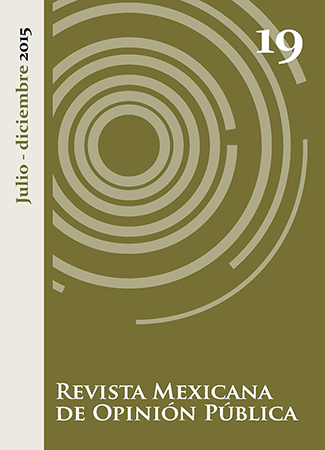Mass Media, News, and their Influence over the Political System
Main Article Content
Abstract
This article sets out to systematize several theoretical frameworks in order to study the relationship between mass media and the political system. Besides their role in-between events and audiences, the starting point of this paper is that mass media are business actors with a crucial role in the political system. On their daily work, they construct news by including, excluding and organizing events hierarchically in journalistic agendas. These tasks are accomplished not just following news values criteria but also strategies designed to obtain certain political-economic goals. By publishing current political events, and maintaining negotiations and agreements with politicians outside the formal democratic process, they are capable to influence over the public policy-making process.
Article Details
Citas en Dimensions Service
References
ALMOND, Gabriel, The American People and Foreign Policy, 2a. ed., Frederick A. Praeger, Nueva York, 1961.
ARUGUETE, Natalia, Los medios y la privatización de ENTEL. El tratamiento noticioso del servicio telefónico argentino antes y después de su transferencia (agosto de 1990 – enero de 1991). Un estudio exploratorio, tesis de doctorado, Universidad Nacional de Quilmes-Departamento de Ciencias Sociales, Buenos Aires, Argentina, 2009.
BAGDIKIAN, Ben, El monopolio de los medios de difusión, Fondo de Cultura Económica, México, 1986.
BAQUERIN DE RICCITELLI, María Teresa, Los medios, ¿aliados o enemigos del público?, EDUCA, Buenos Aires, 2008.
BERGER, Peter y Thomas Luckmann, La construcción social de la realidad, Amorrortu, Buenos Aires, 1997.
BORRAT, Héctor, El periódico, actor político, Gustavo Gili, Barcelona, 1989.
CASERMEIRO PERESON, Alicia, Los medios y las elecciones. La agenda-setting en la Ciudad de Buenos Aires, EDUCA, Buenos Aires, 2004.
COHEN, Bernard, The Press and Foreign Policy, Institute of Governmental Studies, Berkeley, 1963.
D’ADAMO, Orlando, Flavia Freidenberg y Virginia García Beaudoux, “Medios de comunicación de masas y establecimiento de la agenda: un estudio empírico en Argentina”, América Latina Hoy, núm. 25, Universidad de Salamanca, 2000, pp. 57-66.
DOELKER, Christian, La realidad manipulada, Gustavo Gili, Barcelona, 1982.
EILDERS, Christiane, “Media as Political Actors? Issue Focusing and Selective Emphasis in the German Quality Press”, German Politics, vol. 9, núm. 3, Frank Cass, Londres, 2000, pp. 181–206.
EILDERS, Christiane, “The Impact of Editorial Content on the Political Agenda in Germany: Theoretical Assumptions and Open Questions Regarding a Neglected Subject in Mass Communication Research”, Discussion Papers, Research Unit: The Public and the Social Movement, núm. FS III 97-102, Social Science Research Center Berlin (WZB), Berlín, 1997.
ENZENSBERGER, Hans Magnus, Elementos para una teoría de los medios de comunicación, Anagrama, Barcelona, 1972.
EPSTEIN, Edward Jay, News from Nowhere. Television and the News, Vintage, Nueva York, 1974.
EVATT, Dixie y Maxwell McCombs, “Los temas y los aspectos: explorando una nueva dimensión de la agenda-setting”, Comunicación y Sociedad, vol. 8, núm. 1, 1995, pp. 7–32.
FISHMAN, Marc, La fabricación de la noticia, Ediciones Tres Tiempos, Buenos Aires, 1983.
FREEDMAN, Des, The Politics of Media Policy, Polity Press, Cambridge, 2008.
GOMIS, Lorenzo, Teoría del periodismo. Cómo se forma el presente, Paidós, Barcelona, 1991.
HABERMAS, Jürgen, The Structural Transformation of the Public Sphere, The MIT Press, Cambridge, 1989.
HERNÁNDEZ RAMÍREZ, María Elena, “¿Qué son las noticias?”, Comunicación y Sociedad, núm. 14-15, Universidad de Guadalajar, Jalisco, 1992, pp. 235–250.
KIRCHER, Mirta, “La prensa escrita: actor social y político, espacio de producción cultural y fuente de información histórica”, Revista de Historia, núm. 10, 2005, pp. 115–122.
LASSWELL, Harold, “The Structure and Function of Communication in Society”, en Lyman Bryson (ed.), The communication of ideas, Institute for Religious and Social Studies, Nueva York, 1948, pp. 37–51.
LIPPMAN, Walter, Public Opinión, Macmillan, Nueva York, 1922.
MARTINI, Stella, “Las crónicas sobre la violencia global: datos para una teoría de la noticia transnacional”, en Actas del VI Congreso Latinoamericano de Ciencias de la Comunicación de la Asociación Latinoamericana de Investigadores en Comunicación, Asociación Latinoamericana de Investigadores de la Comunicación (ALAIC), Santa Cruz de la Sierra, Bolivia, 2002, pp. 1–16.
MARTINI, Stella, Periodismo, noticia y noticiabilidad, Norma, Buenos Aires, 2000.
MCCOMBS, Maxwell, Estableciendo la agenda. El impacto de los medios en la opinión pública y en el conocimiento, Paidós, Barcelona, 2006.
MCCOMBS, Maxwell y Dan Shaw, “The Agenda-Setting Function of Mass Media”, Public Opinion Quarterly, núm. 36, American Association for Public Opinion Research, Illinois, 1972, pp. 176–187.
MCQUAIL, Denis, Introducción a la teoría de la comunicación de masas, Paidós, Barcelona, 1983.
PAGE, Benjamin, “The Mass Media as Political Actors”, PS: Political Science and Politics, vol. 29, núm. 1, American Political Science Association, Washington, D.C., 1996, pp. 20–24.
PARK, Robert, “News as a Form of Knowledge: A Chapter in the Sociology of Knowledge”, American Journal of Sociology, vol. 45, núm. 5, Chicago, The University of Chicago Press, 1940, pp. 669–686.
RODRIGO ALSINA, Miquel, La construcción de la noticia, Paidós, Barcelona, 2005.
SOROKA, Stuart, “Media, Public Opinion and Foreign Policy”, Press/Politics, vol. 8, núm. 1, 2003, pp. 27–48.
TUCHMAN, Gaye, Making News. A Study in the Construction of Reality, The Free Press, Nueva York, 1978.
VERÓN, Eliseo, Construir el acontecimiento. Los medios de comunicación masiva y el accidente en la central nuclear de Three Mile Island, Gedisa, Buenos Aires, 1987.
WAISBORD, Silvio, “Press and the Public Sphere in Contemporary Latin America”, Harvard‐World Bank Workshop. The Role of the News Media in the Governance Reform Agenda, Harvard Kennedy School, Cambridge, 2008.
WINTER, James y Chaim Eyal, “Agenda-Setting for the Civil Rights Issue”, Public Opinion Quarterly, vol. 45, núm. 3, 1981, pp. 376-383.
WINTER, James, Chaim Eyal y Ann Rogers, “Issue-Specific Agenda Setting: The Whole as Less than the Sum of the Parts”, Canadian Journal of Communication, vol. 8, núm. 2, 1982, pp. 1-10.
WOLF, Mauro, La investigación de la comunicación de masas, Paidós, Buenos Aires, 2004.

Revista Mexicana de Opinión Pública por Universidad Nacional Autónoma de México se distribuye bajo una Licencia Creative Commons Atribución-NoComercial-SinDerivar 4.0 Internacional.
Basada en una obra en http://revistas.unam.mx/index.php/rmop.
